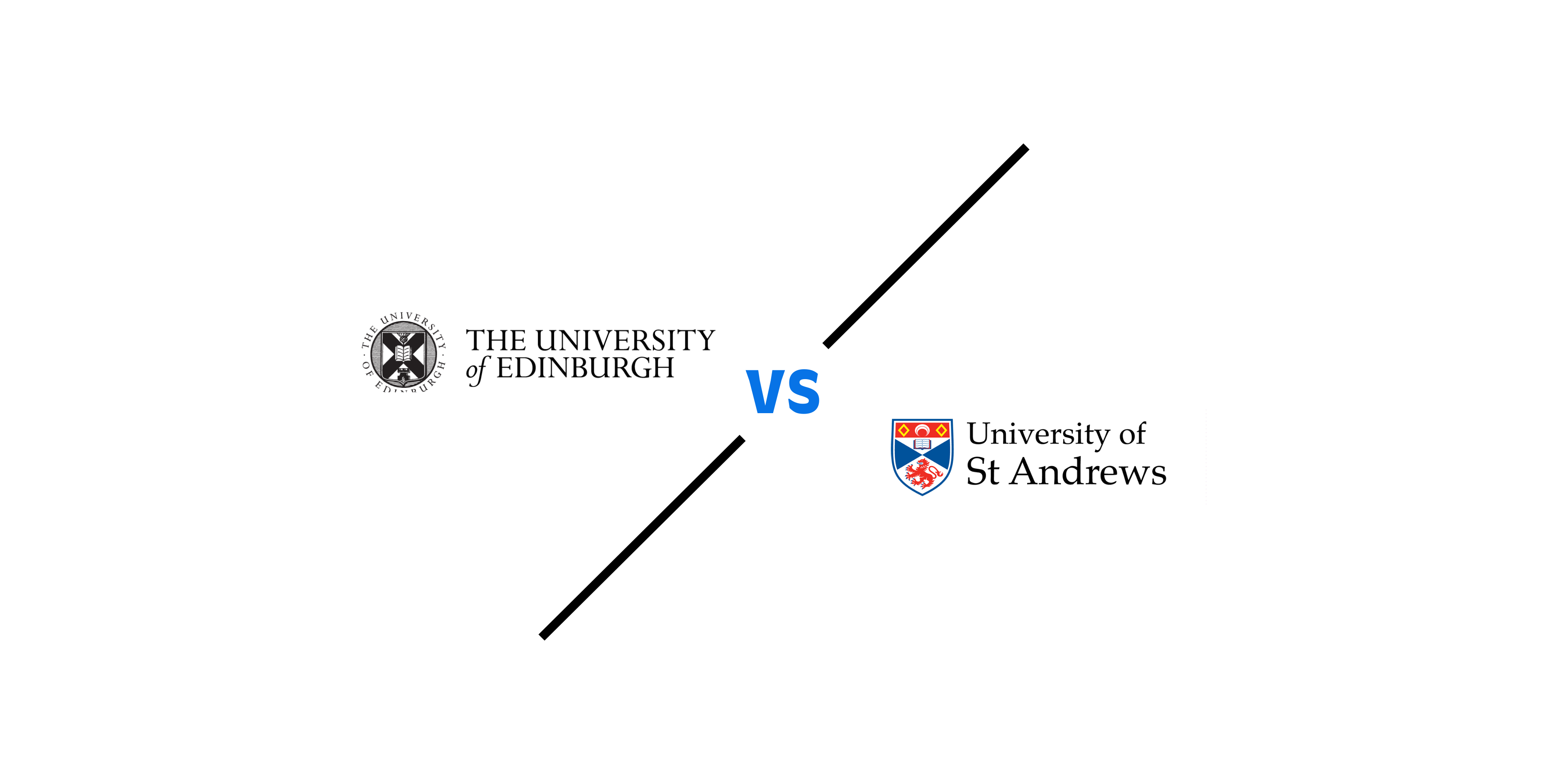Topics covered
- 10 min
- Published: 7 November 2025
- Updated: 6 November 2025
Choosing between the University of Edinburgh and the University of St Andrews? Both are world-renowned Scottish universities offering excellent academic opportunities. Each, however, provides a distinct student experience. Edinburgh is a large, global research university in a lively capital city, while St Andrews is a smaller, close-knit institution in a historic seaside town.
This guide compares Edinburgh and St Andrews in terms of rankings, subjects, costs, scholarships, and student life, helping you decide which is the best fit.
Summary: Edinburgh vs St Andrews
Factor | University of Edinburgh | University of St Andrews |
Year established | 1583 | 1413 |
Location | Capital city - Edinburg | Small coastal town - St Andrews |
Students (Total) | ~40,600 | ~11,900 |
International students | ~11,000 | ~4,900 |
QS World Rankings | #27 | #104 |
Times Higher Education Ranking | 29th | 185th |
Times Higher Education - UK Rank | #5 | #24 |
Campus vibe | Diverse, urban, global city life | Historic, walkable, close-knit community |
Teaching style | Large lectures + later seminars; strong research focus | Small tutorials, personalised teaching; high satisfaction |
Annual Tuition fees (international) | £23,000–£51,000 | £25,000–£37,000 |
Scholarships | - University Merit awards - Faculty-Level awards for specific programs - William Hunter Sharpe Memorial award - Japanese studies scholarships - Muriel Smith award | - International excellence scholarships - International undergraduates' scholarships - BA International Scholarships - St Leonard’s postgraduate scholarships - Kinnessburn Scholarship - Dr Lawrence M Wodehouse Scholarship |
Standout subjects | Arts & Humanities, Medicine & Health Sciences, Veterinary Science, Engineering & Technology, Computer Science, Law, Philosophy, Social Sciences, Artificial Intelligence & Data Science | International Relations, Philosophy, English Literature, History, Economics, Mathematics, Physics, Psychology, Theology & Divinity |
Graduate outcomes | Strong global recognition, city-based internships, and employer networking events. | High UK employability, strong progression in postgraduate studies. |
Note: Fees and scholarships vary by course and intake. Use these figures as a guide only. Speak with an IDP counsellor for advice tailored to your needs.
Student Community
Join the IDP student community
Connect with peers and student ambassadors to hear real experiences, tips, and advise about studying broad.

Rankings and reputation
University of Edinburgh:
The University of Edinburgh is ranked 29th globally in the Times Higher Education (THE) World University Rankings 2025. It ranks particularly highly in Arts & Humanities, Medical and Health Sciences, and Computer Science. With a strong research profile and international outlook, Edinburgh provides students with opportunities to study at one of the world’s leading universities.
University of St Andrews:
The University of St Andrews is ranked 185th globally in THE World University Rankings 2025. It continues to achieve strong results in the UK league tables for teaching quality and student satisfaction. St Andrews is renowned for programs in International Relations, History, Philosophy, Arts & Humanities, and Psychology, combining academic excellence with a supportive learning environment.
Verdict: For worldwide recognition, Edinburgh is the clear winner. For UK-focused prestige, St Andrews shines.
Courses and academic strengths
University of Edinburgh
One of the most comprehensive universities in Europe, offering nearly every subject.
Strong programs in Engineering, Law, Medicine, Veterinary Science, Informatics (AI and Computing), and Social Sciences.
Large faculties, cross-disciplinary projects, and global research links benefits students. For example, engineering graduates often go into renewable energy and aerospace, while informatics graduates join leading tech firms or pursue AI research)
Main strengths: Broad academic range with global recognition.
View courses offered by the University of Edinburgh.
University of St Andrews
Specialises in arts, sciences, and humanities.
International Relations, History, Classics, and Biology are highly ranked in the UK.
Biology and Marine Science students benefit from access to coastal research facilities.
Smaller faculties create a highly specialised academic environment with strong undergraduate mentoring.
Main strengths: Excellence in humanities, arts, and niche sciences.
View courses offered by the university of St Andrews.
Verdict: Edinburgh is ideal if you want a wide range of subjects and professional degrees that open doors globally. St.Andrews is perfect if you’re looking for specialised excellence in arts and sciences within a focused, close-knit academic environment.
Campus and lifestyle
Life as a student in Scotland can feel very different depending on your choice: Edinburgh buzzes with city energy, while St Andrews offers a charming, historic town vibe with a strong sense of community.
University of Edinburgh
Based in the Scottish capital, offering a vibrant, international city vibe.
Festivals, nightlife, landmarks, and cultural diversity shape student life.
Large classes across a city-spread campus can feel less personal.
Endless opportunities for internships, networking and global events.
Students often enjoy the Edinburgh Fringe Festival, Hogmanay celebrations, and international food scene.
Excellent transport links to London and Europe.
University of St Andrews
A walkable medieval town with beaches, castles, and Historic charm.
Everything is on your doorstep—classes, social events, and amenities.
Students enjoy a close-knit community with unique traditions such as academic families (where senior students mentor first-years), May Dip, Raisin Weekend, and formal balls.
Community-driven with fewer distractions, helping students to focus on studies.
Outdoor enthusiasts benefit from golf, coastal walks, and beach sports.
Verdict: Choose Edinburgh for urban energy, diversity and networking opportunities. Choose St Andrews for historic charm, tradition and a focused student lifestyle.
Fees, scholarships and part-time work
Studying in Scotland comes with different costs depending on the university, course and lifestyle. Planning ahead can help you manage tuition, take full advantage of scholarships, and explore part-time work opportunities.
Many students offset their expenses by taking part-time work, either on campus or in the local community, such as café or shop roles, library positions, or short-term internships. International students on a student visa can generally work up to 20 hours per week during term-time and full-time during holidays, gaining practical experience while managing living costs.
University of Edinburgh
Yearly Fees
Tuition: Ranges from £23,000 to £51,000 per year, depending on the program. This range represents the lowest and highest tuition fees among the courses offered at the university.
Please note: As tuition fees vary by course, it is recommended to contact our IDP counsellor for the most accurate information for your chosen program, or you can also view detailed information for each program on our university page.
Part-time work: Students can work part-time, with plenty of opportunities for hospitality and services.
Scholarships-
The University of Edinburgh offers a wide range of scholarships for international students, including university-wide merit awards, faculty-level awards, and other notable funding opportunities. These awards aim to support students financially and recognise academic excellence.
Examples of scholarships available to international students:
William Hunter Sharpe Memorial Award: This merit-based scholarship offers £2,400 towards tuition fees for international students accepted into the full-time MSc Creative Writing programme. Applicants must have, or expect to obtain, the equivalent of a UK first-class or 2:1 Honours degree at the undergraduate level. The application deadline is 4th May 2026.
Muriel Smith Award: Available to international students demonstrating strong academic merit, this award supports those pursuing studies in the Arts and Humanities. Specific award amount varies annually, and competition is highly selective.
Japanese Studies Scholarships: Dedicated funding opportunities are available for international students undertaking Japanese Studies programs. These scholarships support tuition costs and, in some cases, living expenses, depending on the applicant’s academic profile and demonstrated need.
Discover what scholarships are available at the universty of Edinburgh.
University of St Andrews
Yearly Fees and Living costs-
Tuition: Ranges from £25,000 to £37,000 per year, depending on the program. This range represents the lowest and highest tuition fees among the courses offered at the university.
Please note: As tuition fees vary by course, it is recommended to contact our IDP counsellor for the most accurate information for your chosen program, or you can also view detailed information for each program on our university page.
Part-time work: Available, but opportunities are limited compared to Edinburgh.
Scholarships-
International students can access a range of scholarships, from merit-based awards to program-specific funding.
Some key examples are highlighted below.
International Undergraduate Scholarship: Aimed at students with an overseas fee status. This scholarship offers a tuition fee reduction based on financial needs. Applicants must meet specific criteria, including financial need and academic merit.
International Excellence Scholarship: Awarded to international students who show exceptional academic achievement. This prestigious scholarship helps cover tuition fees. The application window for 2026 entry opens on 1 September 2025 and closes on 28 January 2026.
BA International Honours Scholarship: Available to students entering their first year of the BA International Honours Program. This scholarship is offered in collaboration with the College of William & Mary. This scholarship supports students in specific subject areas and requires recipients to take on an ambassadorial role within the program.
Other scholarships for international students include the St Leonard ‘s postgraduate scholarships, the kinnessburn scholarship and the Dr Lawrence M Wodehouse scholarship.
Explore the scholarships available at the University of St Andrews.
Budget tip
Plan early for both tuition and living costs.
Apply for scholarships in advance.
Explore student discounts to reduce monthly expenses.
Cook at home, share accommodation, and use railcards to save money.
Verdict: Edinburgh can be more expensive for some courses, but it offers more part-time job opportunities and a wider range of scholarships, while St.Andrews has lower and more predictable living costs.
Accommodation and Living Costs
University of Edinburgh
Housing options range from modern flats to historic buildings.
Popular central areas are costly, and commuting may be required if you live further out.
University halls and private rentals are common choices.
Students may spend £600–£1500 per month on rent, depending on location.
Commuting costs add another £60–£100 monthly for public transport.
Average monthly living costs, including rent, transport, and food, range from £1,200–£2,000.
University of St Andrews
Accommodation is limited, making competition fierce.
Most students live in university halls or private rentals, usually within walking distance.
Rents typically range from £550–£800 per month, with accommodation being the largest expense.
Savings come from lower transport costs, as most students walk or cycle to classes.
Average monthly living costs are around £1,000–£1,300, with low daily expenses due to the walkable town layout. Tip: The small-town environment encourages community and easy connections with fellow students.
Verdict: Edinburgh offers more choice but at a higher cost; St Andrews offers convenience but limited availability.
Teaching style and career pathways
University of Edinburgh
Large lectures with smaller seminars in later years.
Research-led learning with early exposure to cutting-edge research.
Entry requirements are rigorous, especially for Medicine, Law, and Engineering.
The acceptance rate varies by subject but can be as low as 8–15% for competitive courses. (Note: rates may vary by program, this range reflects general trends for competitive courses)
Placements and internships are well-supported by industry connections in health, finance, tech, and public policy. For example, internships at NHS hospitals, financial firms, and software companies.
University of St Andrews
Known for small-group tutorials and strong academic mentoring.
Offers personal attention and high student satisfaction.
Entry is highly selective, with acceptance rates typically ranging from 11-18% for popular programs. (Note: rates may vary by program, this range reflects general trends for popular course)
Placement options are more limited due to its small-town location.
Niche placement opportunities for marine sciences, history, and international relations.
Students often gain research assistant positions within their departments, which strengthens postgraduate applications.
Verdict: Edinburgh is best for professional training and placements; St Andrews is stronger for personalised teaching.
Graduate outcomes
University of Edinburgh
Graduates are globally competitive, with strong employability in tech, health, law, and business. The city location provides easy access to internships, career fairs, and employer events. Edinburgh alumni frequently advance into senior roles in multinational companies, public institutions, and international organizations, leveraging the university’s extensive professional networks. Edinburgh graduates are commonly recruited by Deloitte, PwC, Accenture, NHS Scotland, and major tech firms. Many also go on to postgraduate study at Oxford, Cambridge, and Ivy League universities.
University of St Andrews
Graduates rank highly in the UK employability tables. A strong academic reputation in specific subjects helps graduates secure roles in government, academia, and research. Alumni often pursue careers in diplomacy, NGOs, heritage, and environmental science. Postgraduate destinations include Oxford, Harvard, and the London School of Economics. Employers value the analytical and writing skills developed in St Andrews’ small-class environment.
Verdict: Edinburgh graduates benefit from strong industry connections and a wide range of professional opportunities, particularly in tech, business, health, and law, while St Andrews graduates excel in analytical and research-focused careers, with strong pathways into government, academia, diplomacy, and international organisations.
Edinburgh Vs St Andrews: How to choose the right university
Deciding between Edinburgh and St Andrews isn’t just about rankings—it's about finding the university that fits your academic goals, lifestyles, and personal growth.
Edinburgh might be the right choice if you:
Prefer a vibrant city environment, with cultural events and career opportunities.
Are interested in STEM, medicine, law or technology.
Want access to modern facilities and research opportunities.
Value hands-on internships, networking events, and global exposure.
Aim for careers in tech, finance, health, law or international organizations, leveraging the university’s strong industry connections and alumni network
St Andrews might be the right choice if you:
Prefer a smaller, historic town with a supportive community.
Are passionate about humanities, social sciences, or arts-focused programs.
Appreciate small class sizes and a focused academic setting.
Seek strong UK employability and postgraduate pathways.
Aim for careers in research, academia, diplomacy, heritage or environmental science, benefiting from St. Andrews’ mentoring and alumni networks.
Conclusion
Studying in Scotland means joining a rich academic tradition and a welcoming international community. Whether you picture yourself in a lively capital city or a historic seaside town, both Edinburgh and St Andrews will give you a world-class education and experiences that shape your future.
Next step: Speak with an IDP counsellor to explore courses, scholarships, and entry requirements. Take advantage of IDP’s free counselling session to compare universities and start your application today.
Not sure which course fits you best? Check out our find a course page to explore options across universities.
FAQs
One account for all your study abroad needs
Create your profile and unlock a wide array of features including personalised recommendations, fast-tracked applications and much more.











